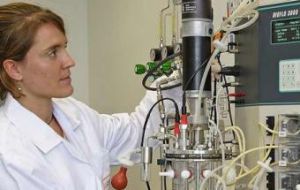MercoPress. South Atlantic News Agency
Promising test for early detection of BSE (mad cow) in cattle

The discovery of elevated protein levels in the urine of some cattle infected with mad cow disease, Bovine Spongiform Encephalopathy, BSE, raises the possibility that animals could eventually be screened using a test similar to a home pregnancy kit, according to reports from the University of Manitoba.
Right now, cows can only be tested for the brain-wasting disease after they've been slaughtered. The discovery in four infected cows was made by researchers from Canada's National Microbiology Laboratory, the Canadian Food Inspection Agency, the University of Manitoba and an animal health institute in Germany. "We're pretty excited about it," said lead researcher David Knox. "It would be sort of like a home pregnancy test. You would just put a strip in the stream of urine and it either comes out positive or negative; ideally, that's what we'd like to have." The results also raise the prospect of eventually developing a urine test which could help diagnose humans with Creutzfeldt-Jakob disease, a degenerative and fatal brain disorder, or other forms of unexplained dementia, Knox said. Mad cow disease is unusual because there is no genetic material unique to it, which makes it impossible to detect using cutting-edge genetic technologies, Knox said. Researchers turned to urine after noticing that infected mice had enlarged bladders. The study - which is published in the journal Proteome Science - only looked at four infected cows and compared them with four healthy cattle, so the next step is to examine a much larger sample set of animals, Knox said. "There is still a long road ahead. Science is pretty unpredictable". Rob McNabb from the Canadian Cattlemen's Association said a test that could be applied to live cattle and provide for continuous monitoring of a herd is a tantalizing prospect but is still a long way off. McNabb, too, said the sample size is very small and any test would have to be recognized globally as foolproof before it could be used by farmers. "There is a very long road that this type of a test has to yet go through" said McNabb, who pointed out scientists have been looking for an accurate live test for 30 years. McNabb said Canadian cattle farmers have perfected a rigorous form of tracing so their entire herds no longer need to be destroyed when the disease is detected.




Top Comments
Disclaimer & comment rulesCommenting for this story is now closed.
If you have a Facebook account, become a fan and comment on our Facebook Page!